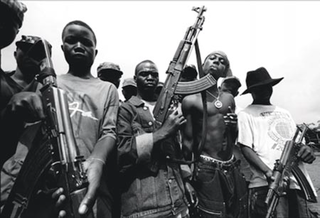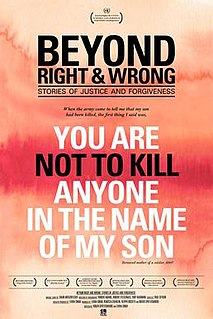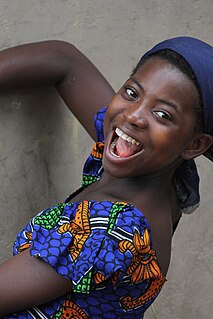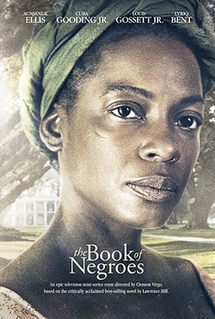
Sierra Leone, officially the Republic of Sierra Leone, colloquially Salone, is a country on the southwest coast of West Africa. It is bordered by Liberia to the southeast and Guinea surrounds the northern half of the nation. Covering a total area of 71,740 km2 (27,699 sq mi), Sierra Leone has a tropical climate, with diverse environments ranging from savanna to rainforests. The country has a population of 7,092,113 as of the 2015 census. The capital and largest city is Freetown. The country is divided into five administrative regions, which are subdivided into 16 districts.
Sierra Leone first became inhabited by indigenous African peoples at least 2,500 years ago. The Limba were the first tribe known to inhabit Sierra Leone. The dense tropical rainforest partially isolated the region from other West African cultures, and it became a refuge for peoples escaping violence and jihads. Sierra Leone was named by Portuguese explorer Pedro de Sintra, who mapped the region in 1462. The Freetown estuary provided a good natural harbour for ships to shelter and replenish drinking water, and gained more international attention as coastal and trans-Atlantic trade supplanted trans-Saharan trade.

Alhaji Ahmad Tejan Kabbah was a Sierra Leonean politician who served twice as the 3rd President of Sierra Leone, from 1996 to 1997 and again from 1998 to 2007. An economist and attorney by profession, Kabbah spent many years working for the United Nations Development Programme. He retired from the United Nations and returned to Sierra Leone in 1992.

The Liberians United for Reconciliation and Democracy (LURD) was a rebel group in Liberia that was active from 1999 until the resignation of Charles Taylor ended the Second Liberian Civil War in 2003. While the group formally dissolved after the war, the interpersonal linkages of the civil war era remain a key force in internal Liberian politics.

The Mende are one of the two largest ethnic groups in Sierra Leone; their neighbours, the Temne people, have roughly the same population. Mende people account for slightly more than 30% of the total population. The Mende are predominantly found in the Southern Province and the Eastern Province, while the Temne are found primarily in the Northern Province and the Western Area, including the capital city of Freetown. Some of the major cities with significant Mende populations include Bo, Kenema, Kailahun, and Moyamba.

Koidu Town is the capital and largest city of the diamond-rich Kono District in the Eastern Province of Sierra Leone. The population of Koidu Town is 124,662 based on the 2015 Sierra Leone national census. Koidu Town is the fifth largest city in Sierra Leone by population, after Freetown, Kenema, Bo and Makeni. Koidu Town is a major urban, business, commercial and diamond trade center. Koidu Town lies approximately 280 miles east of Freetown, and about 60 miles north of Kenema.
The Armed Forces Revolutionary Council (AFRC) was a group of Sierra Leone soldiers that allied itself with the rebel Revolutionary United Front in the late 1990s. While the AFRC briefly controlled the country in 1998, it was driven from the capital by a coalition of West African troops. It was no longer a coherent and effective organization by the elections of 2002.

The Second Liberian Civil War was a civil war in Liberia from 1999 to 2003.
The Sierra Leone Civil War (1991–2002), or the Sierra Leonean Civil War, was a civil war in Sierra Leone that began on 23 March 1991 when the Revolutionary United Front (RUF), with support from the special forces of Charles Taylor's National Patriotic Front of Liberia (NPFL), intervened in Sierra Leone in an attempt to overthrow the Joseph Momoh government. The resulting civil war lasted 11 years, enveloped the country, and left over 50,000 dead.

The Special Court for Sierra Leone, or the "Special Court" (SCSL), also called the Sierra Leone Tribunal, was a judicial body set up by the government of Sierra Leone and the United Nations to "prosecute persons who bear the greatest responsibility for serious violations of international humanitarian law and Sierra Leonean law" committed in Sierra Leone after 30 November 1996 and during the Sierra Leone Civil War. The court's working language was English. The court listed offices in Freetown, The Hague, and New York City.

Mass media in Sierra Leone began when the first modern printing press in Africa arrived at the start of the 19th century. In the 1860s the country became a journalist hub for Africa with professional travelling to the country from across the continent. At the end of the 19th century the industry went into decline and when radio was introduced in the 1930s this became the primary communication media. Print media is not widely read in Sierra Leone, especially outside Freetown, partially due to the low levels of literacy in the country. In 2008 there were 15 daily newspapers in addition to those published weekly. Among newspaper readership young people are likely to read newspapers weekly and older people daily. The majority of newspapers are privately run and are often critical of the government.
The Kono people are a major Mande-speaking ethnic group in Sierra Leone at 5.2% of the country's total population. Their homeland is the diamond-rich Kono District in eastern Sierra Leone. The Kono are primarily diamond miners and farmers.

Michael Sahr Ngaujah is an American theater actor and director. Originally from Atlanta, he spent most of his early career working in experimental theater in Amsterdam. He made his breakthrough for his Tony Award-nominated performance as Fela Kuti in the 2009 Broadway musical Fela! He was nominated for his second Tony Award for his performance Henri de Toulouse-Lautrec in Moulin Rouge! (2019). On screen, he is best known for his roles in ABC's Last Resort (2012) and Netflix's Luke Cage (2018).

Beyond Right & Wrong: Stories of Justice and Forgiveness is a 2012 American documentary film about restorative justice and forgiveness. It is directed by Roger Spottiswoode and Lekha Singh and produced by Lekha Singh and Rebecca Chaiklin. The film depicts victims and perpetrators of the Rwandan genocide, the Israeli–Palestinian conflict, and The Troubles in Northern Ireland.
Exhibit A is a 2007 British independent psychological thriller film directed by Dom Rotheroe and produced by Darren Bender for Warp Films. The film is an example of the found footage genre and stars Bradley Cole, Brittany Ashworth, Angela Forrest and Oliver Lee. It was filmed on location in Yorkshire and Suffolk and released on 1 October 2007 at the Raindance Film Festival. It was the last film that prolific stuntman Roy Alon worked on.

Sierra Leone, officially the Republic of Sierra Leone, is a Constitutional Republic in West Africa. Since it was founded in 1787, the women in Sierra Leone have been a major influence in the political and economic development of the nation.
Literature of Sierra Leone is the collection of written and spoken work, mostly fictional, from Sierra Leone. The coastal west-African country suffered a civil war from 1991 until 2002. Before the civil war, Sierra Leone had many writers contributing to its literature and since the end of the war the country has been in the process of rebuilding this literature. This is an overview of some important aspects of the literature of Sierra Leone before, during, and after the war.

The Book of Negroes is a 2015 television miniseries based on the 2007 novel of the same name by Canadian writer Lawrence Hill. The book was inspired by the British freeing and evacuation of former slaves, known as Black Loyalists, who had left rebel masters during the American Revolutionary War. The British transported some 3,000 Black Loyalists to Nova Scotia for resettlement, documenting their names in what was called the Book of Negroes.
The Order of the Rokel is the second order of Sierra Leone, after the Order of the Republic. It may be awarded to recognize Sierra Leoneans who have distinguished themselves by making valuable contributions to the country in the areas of to the public service, arts and sciences, and philanthropy. The award is normally awarded by the President of Sierra Leone.
John Caulker is a Sierra Leonean political and social activist. He has founded several important nongovernmental organizations.












